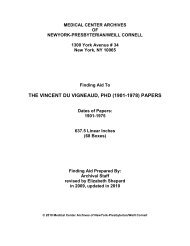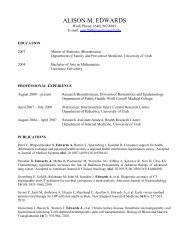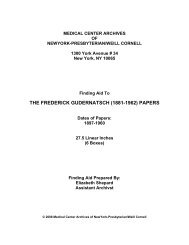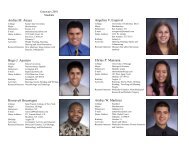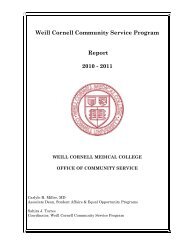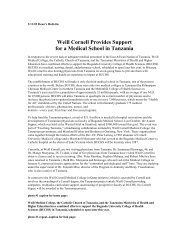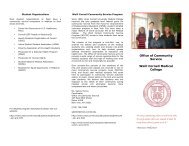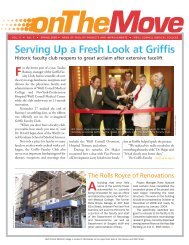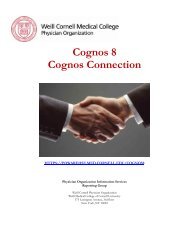Weillcornellmedicine - Weill Medical College - Cornell University
Weillcornellmedicine - Weill Medical College - Cornell University
Weillcornellmedicine - Weill Medical College - Cornell University
You also want an ePaper? Increase the reach of your titles
YUMPU automatically turns print PDFs into web optimized ePapers that Google loves.
to a select few people, mainly physicians,” he says.<br />
“Now it’s available to the public.” Thousands of<br />
websites, blogs, news reports, and even drug<br />
advertisements let patients study their own<br />
cases—and come to doctors’ offices armed with<br />
information, both good and bad. “In some ways,<br />
misinformation is just as bad or even worse than<br />
ignorance, especially when people become their<br />
own doctor,” Marzuk says. “They say, ‘I read on<br />
the Internet that all these patients got treated this<br />
way. Why aren’t you doing this for me? Why<br />
aren’t you giving me this antibiotic?’ Sometimes a<br />
little knowledge is dangerous, because there’s usually<br />
a valid reason why the physician is recommending<br />
treatment A rather than B.”<br />
Misinformed patients may not only advocate<br />
for inappropriate tests and treatments; they may<br />
also shy away from a therapy, frightened by sensationalized<br />
accounts of side effects posted online,<br />
Marzuk says. “People can get very scared. They’re<br />
sifting through a lot of passionately phrased—<br />
sometimes hyperbolic—descriptions.” If misinformation<br />
doesn’t hurt a patient, at the very least it<br />
can waste time during an already limited office<br />
visit. Says Kendler: “It might take me more time to<br />
explain that you can read what you want on the<br />
Internet, but that’s not the same as having years of<br />
experience seeing these problems and knowing<br />
what certain diseases look like.”<br />
Still, Kendler says, the plethora of online<br />
medical information can be helpful, making<br />
patients better educated about their health than<br />
in the past. A patient who has researched a disease<br />
and knows the basics can have more time<br />
during the visit for other questions. “Very<br />
often,” he says, “what they’ve read on the<br />
Internet allows for a more educated discussion.”<br />
While some sites disperse disinformation, many<br />
offer excellent resources, especially for chronic<br />
conditions like high cholesterol and diabetes.<br />
When Kendler counsels patients about upcoming<br />
travel, for example, he explains pre-trip vaccines<br />
and precautions. “Then I say, ‘You can also<br />
go to the CDC website, and they have a wonderful<br />
section where you can read more if you’re<br />
interested.’”<br />
Patient scrutiny both before and during the<br />
office visit can also challenge doctors to keep up<br />
with the medical literature. “If they’re suggesting<br />
something completely off base, it makes you feel<br />
that you have to explain yourself better,” Kendler<br />
says. He notes that the increasing availability of<br />
information has developed hand in hand with<br />
more open dialogue in the doctor-patient relationship.<br />
“Many years ago, doctors would keep certain<br />
things to themselves—they wouldn’t tell patients<br />
they had cancer,” Kendler says. “Nowadays you<br />
not only tell the patient, but the patient can go<br />
online and look up the prognosis.”<br />
— Susan Kelley<br />
RICHARD LOBELL<br />
Three’s Company<br />
NYPH/WCMC welcomes identical triplet boys<br />
For Desmond and Kerry Lyons, the odds of winning the lottery no<br />
longer seem that long. In October, the Irvington, New York, couple<br />
became parents of identical triplets, born at NewYork-Presbyterian<br />
Hospital/<strong>Weill</strong> <strong>Cornell</strong> <strong>Medical</strong> Center. The babies were conceived without<br />
fertility treatments, an event whose likelihood experts peg at roughly<br />
one in 100 million. Even more remarkable is the fact that all three boys—Kevin<br />
Patrick, Declan Gerard, and Cormac Francis—were born in perfect health. “Not all<br />
triplet births come out this well,” says Robin Kalish, MD, the assistant professor<br />
of obstetrics and gynecology who delivered them. “Kerry was fine throughout the<br />
pregnancy and had almost no complications.”<br />
At first, the Lyonses (Desmond is an attorney, while Kerry works in online<br />
advertising) couldn’t believe they were having triplets; they already had two children,<br />
four-year-old son Liam and two-year-old daughter Ciara. Disbelief quickly<br />
turned to concern due to the increased risks inherent in multiples, including diabetes,<br />
high blood pressure, and pre-term labor. Kalish was also worried about the<br />
potential for an uneven distribution of nutrients, since all three fetuses were sharing<br />
one placenta. But the pregnancy went smoothly, and Kerry and the boys left<br />
the hospital just four days after delivery. (On her way out, she asked the hospital<br />
staff: “Any of you guys want to come and help?”)<br />
The triplets’ arrival landed the family on CBS-TV’s “The Early Show” and garnered<br />
extensive coverage in the New York metro area media. But according to<br />
Desmond, son Liam is most excited about one thing in particular: the prospect of<br />
having three brothers to play soccer with. “There’s certainly a feeling of something<br />
special going on,” Desmond says. “I’m a firm believer in that God gives you only<br />
what you can handle. It’s a miracle. They’re all healthy—and we’re very happy.”<br />
— Chris Nelson<br />
And babies make seven: The burgeoning Lyons family leaves the hospital.<br />
WINTER 2008/09 15



